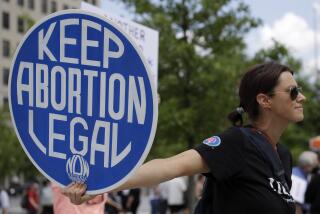Decision Outlawing Games in Tennessee Angers Charities : Ban on Bingo Puts Programs in a Pinch
- Share via
CHATTANOOGA, Tenn. — Everything was set for the grand opening of weekend bingo at the Orange Grove Center here. The electronic game board was in place, 50 tables were polished and ready for action and, as a final touch, a 16-foot-long banner with “Bingo, Bingo, Bingo” in bright red letters had been stretched across the cafeteria stage.
Then, in a move that provoked cries of anguish and foul play from churches, schools, charities and civic groups across the state, the Tennessee Supreme Court ruled last week that bingo games violated the state constitution’s ban on lotteries.
State regulators promptly ordered all the nearly 160 licensed bingo parlors to close immediately, thus pointing Tennessee in the opposite direction from a national trend in which lotteries and wagering of all sorts have gained new respectability as sources of funds for charities and state governments.
Start-Up Investment Lost
At Orange Grove Center, a private, nonprofit operator of programs for 600 retarded children and adults, the blow came particularly hard. With its bingo profits the center had hoped to set up a $100,000 summer program for 128 children. More than $30,000 already had been shelled out for bingo equipment, additional bathrooms and parking lot renovations.
“The bomb was dropped on us before we could get the first ‘B-1’ called,” said Hal Baker, Orange Grove’s development director. “We got the news four days before the doors were supposed to open. This puts us at ground zero minus $130,000.”
In Memphis, the Roman Catholic diocese faces an annual loss of more than $1 million in bingo revenues it used to help finance educational programs for parish churches and schools.
“A lot of people are upset, particularly the elderly, who found bingo games a time for social gathering and fun,” said James Kleiser, the diocese’s chief financial officer.
Out-of-State Excursions
Willie Cartwright, one of the hundreds of Tennesseans who rode crowded chartered buses last weekend to play their favorite game on an Indian reservation in North Carolina, said of the state court ruling: “It’s communism, what they done to bingo!”
In recent years, there has been mounting evidence of abuse of Tennessee bingo laws. A study by the secretary of state’s office found that only 2% of the $47.6 million bingo operators collected in 1988 went to charity. About 74% of the money, or $35 million, was paid out in prizes; the balance went to cover salaries, rent and other expenses.
“You had so many storefront bingo operations that were setting up phony operations that it was a joke,” said Joe Brown, the U. S. attorney in Nashville, the capital. “They’d hold a game one day for autistic children and the next day for hypertension and the third for something else.”
In addition, federal officials said, investigators had discovered that bingo operators were offering bribes to state officials.
Bingo Audit Disputed
Such disclosures have left many legitimate bingo operators feeling they have been unfairly tarnished. The Memphis Roman Catholic diocese, for example, said its $1 million a year in bingo proceeds was not counted as going to a charity because it remained within the diocese. Others said that bogus operators had been, in effect, driven out of business since the state enacted tough new regulations last year.
The state Supreme Court ruling came on an appeal from Amvets Post No. 21 in Kingsport, near the Virginia border, which lost its license after it was found to have contributed to charity only $105 of the $360,000 it raised from bingo games within a one-year period.
In denying the appeal, the five-member court unanimously dismissed arguments that bingo was not a form of lottery, thus overturning a legislative exemption to the state constitution under which bingo had been allowed since the early 1970s.
Later, the secretary of state’s office decided that raffles also fell under the court’s prohibition on lotteries.
Many Groups Registered
About 750 organizations are registered to conduct raffles in Tennessee. Among them are the Nashville Junior Chamber of Commerce, which raised $40,000 in a raffle last year for a physical therapy clinic at Vanderbilt Medical Center, and the St. Peter Home for the aged in Memphis, which takes in about $50,000 each year by selling chances on a car at its Fourth of July picnic.
Peggy Catalano, director of the secretary of state’s division that regulates raffles, said the ban on lottery games might even be extended to door prizes and “country cakewalks”--a Southern custom of musical chairs in which tickets are sold for chances and the winner is awarded a cake.
Change Believed Unlikely
About the only hope for reinstatement of bingo games and raffles seems to be a state constitutional convention, but most political observers said the Legislature is unlikely to call for one.
“I have been trying for years to pass a measure to eliminate the prohibition on lotteries. . . . It has been approved by the Senate, but never by the House,” state Sen. Stephen Cohen (D-Memphis) said. He added that the bingo prohibition makes Tennessee “look really backwards.”
More to Read
Sign up for Essential California
The most important California stories and recommendations in your inbox every morning.
You may occasionally receive promotional content from the Los Angeles Times.













